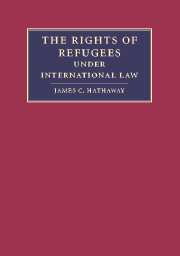Book contents
- Frontmatter
- Contents
- Acknowledgments
- Table of cases
- Table of treaties and other international instruments
- Abbreviations for courts and tribunals cited
- Introduction
- 1 International law as a source of refugee rights
- 2 The evolution of the refugee rights regime
- 3 The structure of entitlement under the Refugee Convention
- 4 Rights of refugees physically present
- 5 Rights of refugees lawfully present
- 6 Rights of refugees lawfully staying
- 7 Rights of solution
- Epilogue: Challenges to the viability of refugee rights
- Appendices
- Select bibliography
- Index
5 - Rights of refugees lawfully present
Published online by Cambridge University Press: 06 January 2010
- Frontmatter
- Contents
- Acknowledgments
- Table of cases
- Table of treaties and other international instruments
- Abbreviations for courts and tribunals cited
- Introduction
- 1 International law as a source of refugee rights
- 2 The evolution of the refugee rights regime
- 3 The structure of entitlement under the Refugee Convention
- 4 Rights of refugees physically present
- 5 Rights of refugees lawfully present
- 6 Rights of refugees lawfully staying
- 7 Rights of solution
- Epilogue: Challenges to the viability of refugee rights
- Appendices
- Select bibliography
- Index
Summary
As the degree of attachment between a refugee and a state party increases, so too do the rights which the refugee may claim. All of the rights acquired by simple physical presence – to enter and remain in the asylum state; freedom from arbitrary detention or penalization for illegal entry; protection of physical security; access to the necessities of life; protection of property; respect for family unity; free exercise of thought, conscience, and religion; access to basic education; documentation of identity and status; and to benefit from administrative assistance and access to the courts – continue for the duration of refugee status. But once a refugee is not only in fact under the jurisdiction of a state party to the Convention, but also lawfully present in that country, he or she acquires three additional rights.
First, a refugee who is lawfully present enjoys both substantive and procedural protections against expulsion. These guarantees govern any effort to remove the refugee to any country, and are in addition to the right not to be sent to a country in which there is a risk of being persecuted.
Second, lawfully present refugees enjoy a presumptive right to freedom of internal movement. As previously observed, the Refugee Convention grants states only a limited prerogative to detain a person seeking refugee status until his or her identity is established, basic security concerns are investigated, and the asylum-seeker's cooperation is secured for purposes of conducting all necessary investigations into his or her claim to protection.
- Type
- Chapter
- Information
- The Rights of Refugees under International Law , pp. 657 - 729Publisher: Cambridge University PressPrint publication year: 2005



